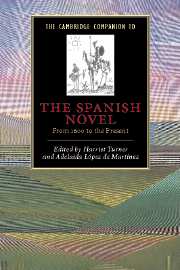Book contents
- Frontmatter
- 1 On the novel: mirror and text
- Part 1 Since Cervantes
- Part 2 The nineteenth century
- Part 3 The twentieth century
- 10 From the Generation of 1898 to the vanguard
- 11 The testimonial novel and the novel of memory
- 12 Questioning the text
- 13 Women and fiction in post-Franco Spain
- 14 Cultural alliances: film and literature in the socialist period, 1982–1995
- 15 The novel beyond modernity
- 16 Writing about writing
- Bibliography
- Index
- Series List
12 - Questioning the text
from Part 3 - The twentieth century
Published online by Cambridge University Press: 28 May 2006
- Frontmatter
- 1 On the novel: mirror and text
- Part 1 Since Cervantes
- Part 2 The nineteenth century
- Part 3 The twentieth century
- 10 From the Generation of 1898 to the vanguard
- 11 The testimonial novel and the novel of memory
- 12 Questioning the text
- 13 Women and fiction in post-Franco Spain
- 14 Cultural alliances: film and literature in the socialist period, 1982–1995
- 15 The novel beyond modernity
- 16 Writing about writing
- Bibliography
- Index
- Series List
Summary
Sometime during the 1960s, the mirror breaks for Spanish narrative. Such works as Luis Martín Santos's Tiempo de silencio (Time of Silence, 1962), Juan Goytisolo's Señas de identidad (Marks of Identity, 1966), Miguel Delibes's Cinco horas con Mario ('Five Hours with Mario', 1966), José María Guelbenzu's El mercurio ('Mercury', 1968), Camilo José Cela's Vísperas, festividad y octava de San Camilo del año 1936 en Madrid (San Camilo in 1936: The Eve, Feast, and Octave of St. Camillus of the Year 1936 in Madrid, 1969) and, most radically, Juan Benet's Volverás a Región (Return to Region, 1967) wreak havoc on the reality, idea, and ideal of realism. To different degrees, and from often considerably different ideological positions, each of these works twists, blurs, stretches, smashes, or scoffs at mimetic representation, communicability, and referentiality. Language, turned into its own object, becomes opaque, restive, polyvalent, and at times even purposeless. The trend is solidified in the early 1970s with the publication of Goytisolo’s Reivindicación del conde don Julián (Count Julián, 1970), Benet’s Una meditación (A Meditation, 1970) and Un viaje de invierno (‘A Winter’s Journey’, 1972), Gonzalo Torrente Ballester’s La saga/fuga de J. B. (‘The Saga/Fugue of J. B.’, 1972), Juan Marsé’s Si te dicen que caí (The Fallen, 1973), Luis Goytisolo’s Recuento (‘Recount’, 1973), and Juan Goytisolo’s Juan sin tierra (Juan the Landless, 1975).
- Type
- Chapter
- Information
- The Cambridge Companion to the Spanish NovelFrom 1600 to the Present, pp. 193 - 211Publisher: Cambridge University PressPrint publication year: 2003
- 1
- Cited by



